Best Platforms to Sell Notion Templates
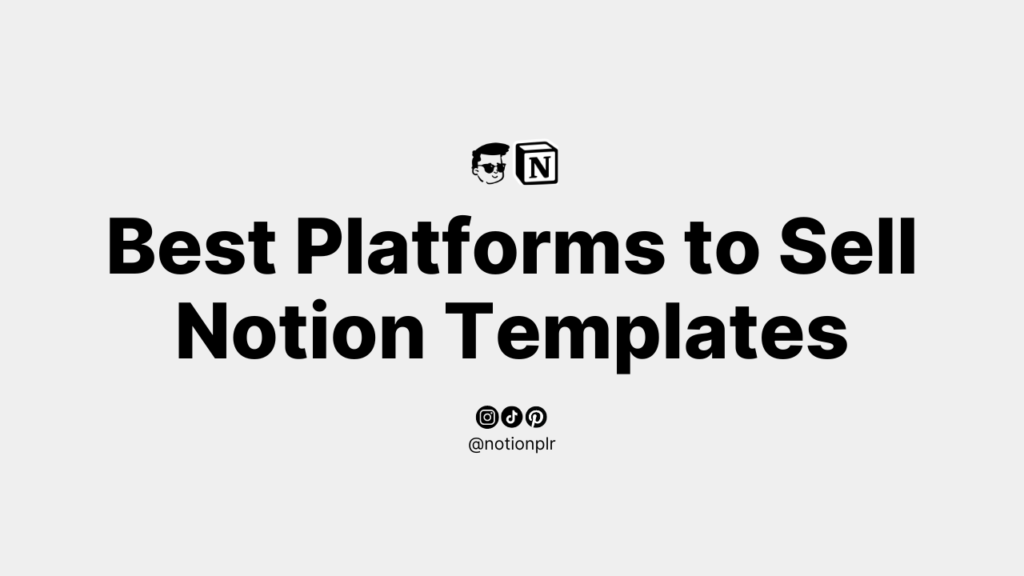
This guide is all about choosing the best platforms to sell Notion templates. It outlines what features to look out for and also helps you decide if you should sell on a 3rd-party platform or on a platform in which you have 100% ownership.
Selecting the right platform is crucial, as it can greatly influence the visibility, sales, and overall success of your Notion templates.
Several marketplaces stand out due to their specialized focus or their accommodating features for sellers. Some platforms provide extensive reach and traffic, which are fundamental for amplifying the exposure of Notion templates. Others offer a more niche audience, appealing to creators who target specific user groups or industries.
Factors such as ease of use, fee structure, and community engagement play a significant role in determining the best platform for selling these versatile and customizable templates.
Let’s look at these in more detail.
Importance of Choosing the Right Platform for Sales
The beauty of selling digital products like Notion templates is that you can choose multiple channels to sell them because fulfilment is digital and can be easily automated.
However, there are certain factors that you need to consider which will help you as a creator effectively market your products and promote them to the right target audience.
Marketplaces differ significantly in terms of their audience reach, usability, and niche alignment. A platform well-suited for Notion templates will likely offer:
- Targeted Visibility: Platforms that cater specifically to productivity tools or business templates may provide a more concentrated audience.
- Integrated Marketing Tools: Features like email campaigns, social media integration, and discount codes aid in effective marketing strategies.
- Customer Insight: Analytics tools enhance understanding of buyer behavior, enabling better product positioning and promotion.
It’s about making sure one’s digital goods are not only seen but also seen by the right people. A mismatched platform can lead to a lack of sales, irrespective of the quality or utility of the Notion templates. Thus, the right platform is a balance of exposure and relevance.
Criteria for Selecting a Platform
Here’s a simplified list of criteria to consider when selecting a platform:
- Audience: Does it have the right users?
- Fees: What will it cost to sell and share the templates?
- Ease of Use: How simple is it to set up and maintain a storefront?
- Support: Is there help available for new sellers?
Each platform also comes with its community and brand perception, further impacting the likelihood of successful sales. In essence, the correct choice helps streamline one’s sales strategy for maximum market penetration and profitability.
The structure of the marketplace is also crucial. Sellers should look for a platform that enables them to categorize and display their templates effectively, ensuring potential buyers can find what they’re looking for with ease. An intuitive user interface can significantly enhance the shopping experience.
Criteria for an ideal platform include:
- User Traffic: A high volume of users translates to more potential customers.
- Marketing Tools: The availability of features like promotional listings or featured spots can increase visibility.
- Seller Support: Strong customer service for sellers can help resolve issues quickly.
Another element to consider is the transaction fee structure. Sellers need clarity on how much of their sales will be deducted as commission. Platforms charging a lower transaction fee may allow sellers to keep a larger portion of their earnings, though higher fees could be a trade-off for better exposure or additional services.
Finally, sellers should conduct a test period, if possible, to gauge the fit of the platform with their selling style and product range. Platforms that offer a trial period can be advantageous for this reason, allowing sellers to make an informed decision without upfront investment.
By carefully evaluating each of these aspects, sellers can confidently select a platform that aligns with their specific needs and helps them reach their sales goals effectively.
Best 3rd Party Marketplaces to Sell Notion Templates
Selling Notion templates on third-party platforms can be an effective way to reach potential customers. The following is an analysis of the pros and cons of various platforms where creators can sell their Notion templates.
Gumroad
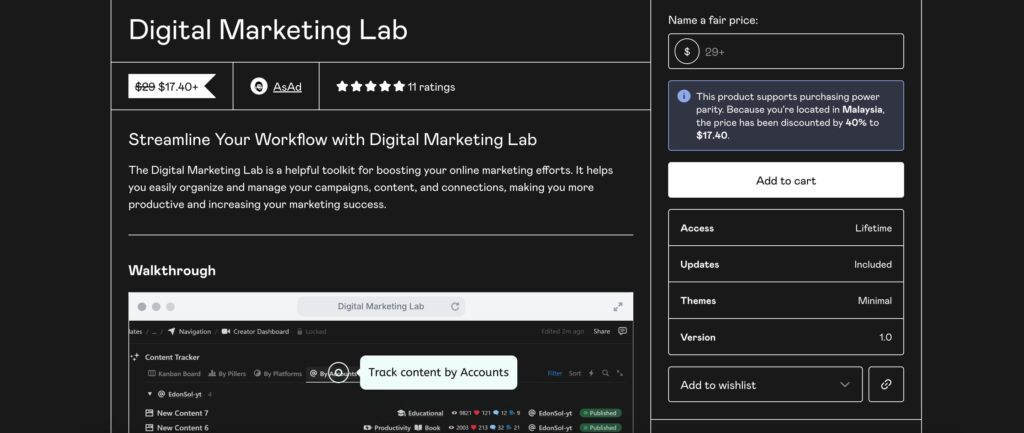
Why sell Notion templates on Gumroad?
- Gumroad has a large, established audience making it a go-to platform for creators looking to sell Notion templates.
- Easy to set up and use, with flexible payment options.
However,
- Gumroad fee of 10% plus additional transaction fees can cut into profits.
NotionEverything
Why sell Notion templates on Notion Utopia?
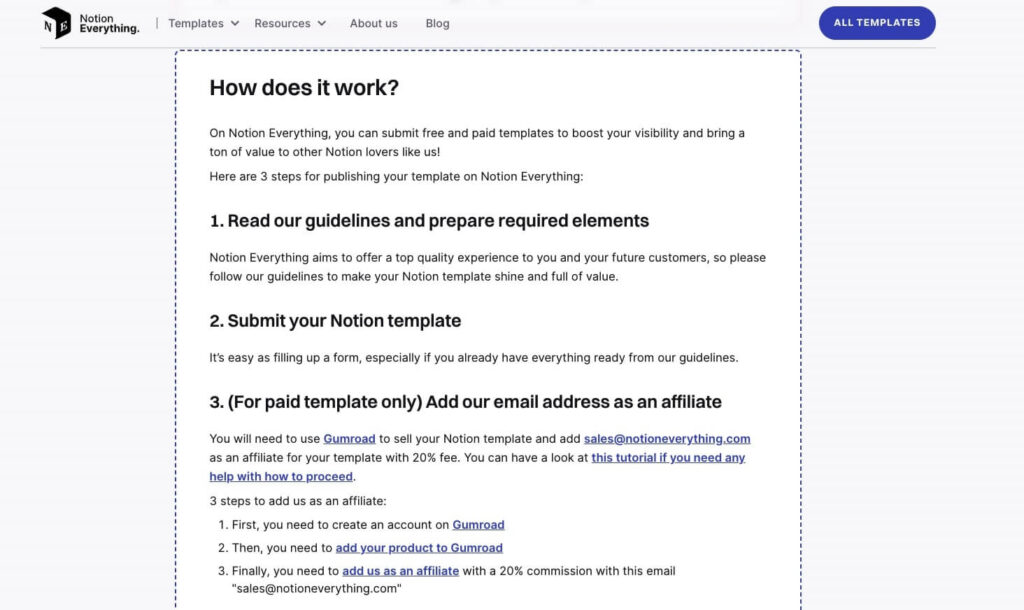
- It’s a growing marketplace dedicated to selling only Notion templates.
- Offers a targeted user base specifically interested in Notion templates and tools.
However,
- May have less traffic compared to larger marketplaces, potentially affecting sales.
Etsy
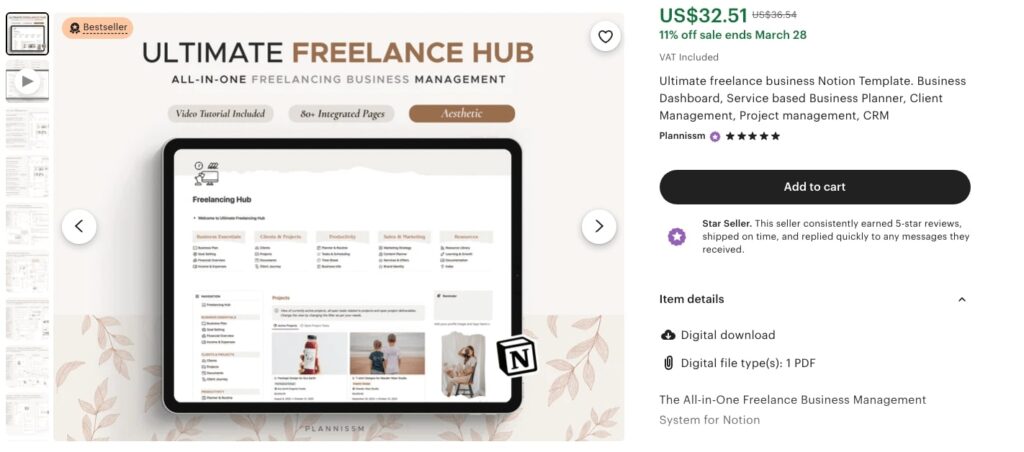
Why sell Notion templates on Etsy?
- Well-known platform with a broad audience that includes marketplaces like Notionery and Easlo, accommodating a variety of digital products.
- Supports creative presentation through icons, images, and widgets.
However,
- Strong competition with non-Notion products may dilute visibility.
- Listing and transaction fees apply.
Prototion
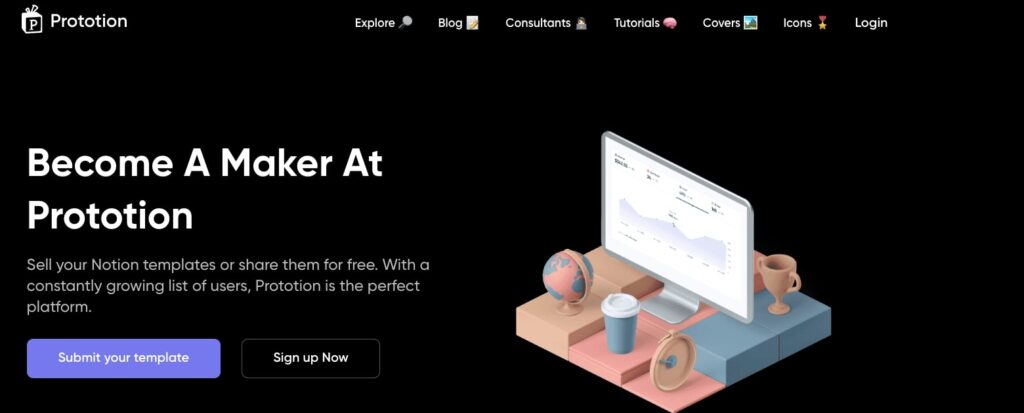
Why sell Notion templates on Protion?
- Exclusively for Notion tools and templates, presenting a very niche community of Notion users.
- Niche community ensures all traffic is relevant and interested in Notion.
However,
- Limited to Notion-specific audience, which may restrict the scale of sales.
Self-Hosted Platforms
Selling Notion templates via self-hosted platforms provides sellers with full control and a direct customer relationship. This method involves more upfront work but allows for greater customization and the potential to avoid marketplace fees.
Custom-Build Storefront

Creating and selling Notion templates directly through your own website is a powerful way to establish a brand and foster a direct relationship with customers. This avenue permits full customization of text, layout, and design, affording a unique presentation of your digital products.
Pros
- Full Control Over the Sales Process: Sellers can control every aspect of the sale, from marketing to the final transaction.
- No Marketplace Fees: Keep all profits without sharing a percentage with marketplaces.
Cons
- Requires More Effort in Setup and Maintenance: Sellers need to invest time and resources into website creation and upkeep.
- Responsibility for Driving Traffic and Marketing: Sellers must strategize to attract visitors, as there is no built-in audience like on a marketplace.
Self-Hosted E-commerce Solutions
Utilizing self-hosted e-commerce solutions for selling Notion templates can be a lucrative side hustle. Platforms like WooCommerce or Magento offer extensive customization options for branding and functionality, potentially integrating with other digital products and services.
Pros
- Customization Options: Modify every element of the storefront to fit the brand and products.
- Potential for Passive Income: With the right setup, sellers can make money while they sleep, through automated sales processes.
Cons
- Can Be Complex to Set Up and Manage: These platforms often have a learning curve and may require technical knowledge to optimize.
- Costs Associated With Hosting and Potential Add-Ons: There might be initial and ongoing expenses for hosting services and additional features.
Which platform will you choose to sell your Notion templates?
Selling Notion templates has become a lucrative opportunity for those with an eye for design and a knack for productivity. Notion users, ranging from students in need of a reliable planner to professionals seeking efficient project management tools, find value in custom templates. This offers a robust starting point for individuals looking to organize their personal finance or establish a habit tracker.
Platforms like Gridfiti and Pascio present curated marketplaces for creators to make money selling Notion templates. Gridfiti helps by advertising digital products to a broader audience, while Pascio offers an interactive experience with its platform specializing in Notion products. For those just beginning to create Notion templates, online communities and official template galleries provide invaluable resources and free templates for inspiration.
Notion’s app facilitates varied functionalities from note-taking to bookmarking, appealing to a diverse user base. Popular Notion templates often include journals, to-do lists, and planners—all demanding a high degree of customization.
To monetize Notion templates effectively, sellers should focus on mobile optimization as mobile users continue to grow. Additionally, alternative support avenues like Ko-fi offer an avenue for creators to receive payments directly from users who appreciate their work.
In summary, with strategic use of popular sales platforms and community engagement, template developers can turn their Notion expertise into a profitable venture.
Frequently Asked Questions
When it comes to selling Notion templates, one needs to navigate through several crucial steps and considerations to ensure profitability and success. These frequently asked questions cover the essentials from pricing strategies to legalities.
How can one profitably sell their Notion templates online?
To sell Notion templates profitably, creators must understand the market demand, craft high-quality and unique templates, and use the right marketing strategies to reach potential buyers. Diverse, well-designed templates that solve specific problems are more likely to garner a successful sales outcome.
What strategies should be considered when pricing Notion templates for sale?
Effective pricing strategies include evaluating the template’s complexity, the time invested in creating it, its utility, and competitive pricing. A tiered pricing system may also be implemented, offering different versions of a template at various price points, making them accessible to a broader audience.
Which online marketplaces are most effective for distributing Notion templates?
Certain online marketplaces like Gumroad and Etsy have gained popularity among Notion template creators due to their large user bases and ease of use. Selecting the right platform that aligns with the target audience is crucial for effective distribution.
What steps are required to prepare a Notion template for sale?
Preparation for sale includes ensuring the template has a clean and user-friendly design, creating comprehensive instructions for use, and removing any personal information. Additionally, high-quality images and descriptions can enhance the template’s listing for potential buyers.
Are there any benefits to selling Notion templates through a personal website vs third-party platforms?
Selling through a personal website allows for greater control over branding, customer relationships, and profit margins. It eliminates third-party fees, which can increase profitability, but may require more effort in driving traffic and managing the sales process.
What legal considerations should be taken into account when selling Notion templates?
Creators must ensure they have the legal right to all elements used in their templates, comply with copyright laws, and protect their work with appropriate licenses. Clear terms of use should be established to prevent unauthorized distribution or modification of the templates.
